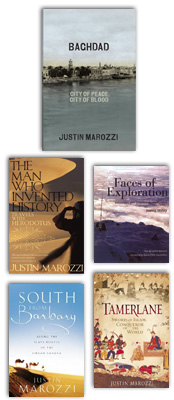THE THUNDERER
Doing the rounds on Twitter yesterday was a Vanity Fair story that neatly encapsulated the way Libya has been reported for years. Headlined “Dictator Chic: Colonel Gaddafi —A Life in Fashion”, it featured a series of outlandish costumes ranging from Saturday Night Fever to Liberace. That’s not how it feels to Libyans on the streets of Tripoli. They are more concerned with snipers and helicopter gunships. They’re in a fight for their lives.
I was a child born a year after Gaddafi ousted King Idris, with a father who did business in Libya, so the country was a constant backdrop to my childhood in the Seventies and Eighties, To a small boy, it meant Globetrotter suitcases stuffed with blood oranges, dates, bakhlava and multi-coloured jalabas for my mother and sisters. I was only dimly aware of The Green Book, a trio of slim volumes summarising Gaddafi’s political philosophy, as an eccentric souvenir on my father’s bookshelves.
Only in the Nineties did I experience first-hand the reality of Gaddafi’s Libya. “Don’t discuss politics anywhere and under no circumstances mention Gaddafi by name,” my father said on my first visit. The mukhabarat (intelligence) officials, reviled as “antenna”, were everywhere: in hotel foyers, listening in on telephone calls, doubling as taxi drivers.
Years later, after completing a 1,500-mile journey by camel across the Libyan Sahara, a friend and I were put under house arrest for a week. We were investigated by security officials as suspected foreign spies, harangued daily about British imperialism and warned never to mention Gaddafi by name. Our terrified local guide was subjected to a much harsher grilling. We never discovered what the authorities did to him.
This is a regime in which the disjunction between rhetoric and reality, between clown and butcher, dandy and torturer-in-chief, has been extraordinary. Saif-al-Islam, Gaddafi’s son, personifies this reality gap. In 2002, I interviewed him at Claridge’s, where he expounded the virtues of democracy without any trace of irony.
To oust Gaddafi in the teeth of such vicious government repression, Libyans are displaying astonishing courage. This is a regime that, like its fellow Middle Eastern police state kleptocracies, has serially failed its people with failed socialism, failed pan-Arabism, failed pan-Africanism, support for international terrorists and with a human rights record best exemplified by the award of the 1998 Gaddafi Prize for Human Rights to Fidel Castro.
Justin Marozzi is the author of South from Barbary: Along the Slave Routes of the Libyan Sahara

